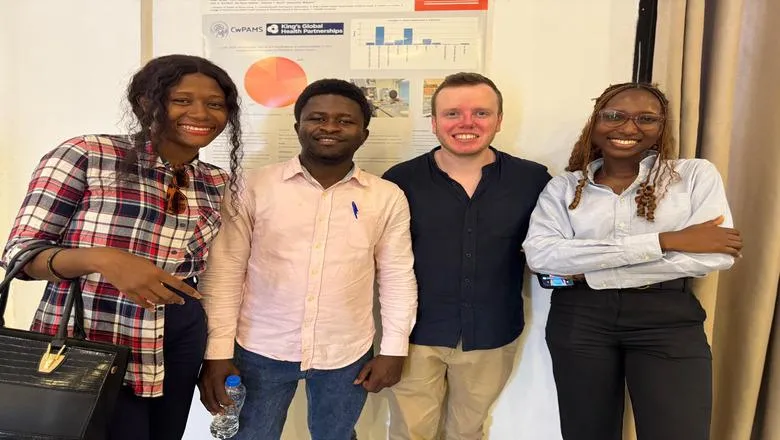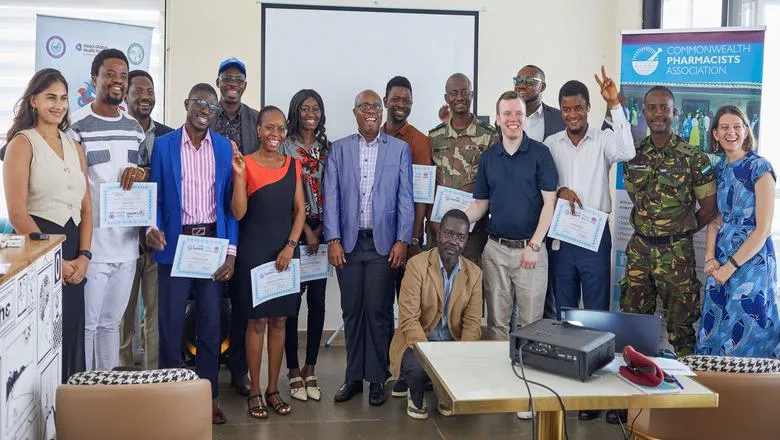Antimicrobial resistance is a big problem in our country... We (the Ministry of Health) cannot overemphasise that antimicrobial stewardship is extremely important.”
Dr Mustapha Kabba, Deputy Chief Medical Officer of Sierra Leone
21 November 2024
This week is World Antimicrobial Resistance Awareness Week (18 November – 24 November 2024), a World Health Organisation initiative to raise public awareness against one of the greatest threats to global health.
Here, volunteer pharmacist Alex Quayle from King’s Global Health Partnerships explains the danger of antimicrobial resistance in the global south, and how King’s are taking a leading role in promoting safe stewardship of antimicrobial drugs to help stem the coming tide.
On a hot June day earlier this year, fresh off the back off a keke roaring past children playing in the street, I set foot in Freetown; the capital of Sierra Leone and the city that was to be my home for almost six months amidst an ongoing global crisis.
Antimicrobial resistance (AMR), the evolutionary process by which microbes become resistant to antimicrobial drugs, is now responsible, directly or indirectly, for nearly 5 million deaths a year. Covid-19 killed 7 million throughout the pandemic.
Spurred on by the misuse of antibiotic substances in humans, animals and the environment, this figure is likely to double to 10 million by 2050. As the tsunami of AMR builds, complex surgeries and treatments which rely on antimicrobials will likely fail, blocking ways to safely tackle cancer, HIV/AIDS, TB and more. AMR has also been shown to hamper child development, slow economic growth and reduce agricultural output – costing trillions of dollars.
High rates of infectious disease, limited access to high-quality medication and uneven regulation concerning antibiotic usage mean that low-income countries risk bearing the brunt of this global burden. Sierra Leone, a West-African former British colony and one of the poorest countries on earth firmly falls under this category.

60% of the population live on $1.25 USD a day and 70% are below the poverty line. It is placed amongst the ten worst performing countries in terms of neonatal, child mortality and maternal mortality, and 10% of children still die before age five.
It was this world into which I first came as part of King’s Global Health Partnerships (KGHP), King’s global arm strengthening health systems across five countries in Sub-Saharan Africa. I was here to help support Sierra Leonean colleagues in the world’s first pharmacist-led scheme to tackle AMR.
Antimicrobial Stewardship in Sierra Leone: A new beginning
Key to tackling AMR is a strong governance of the use of antimicrobials. The focus is to reduce the unnecessary consumption of these drugs, collating data to map infection rates, medicine usage and the spread of AMR. To action these, you need a bedrock of governance, from monitoring committees to state-of-the-art labs to understand infection. We commonly refer to this as antimicrobial stewardship (AMS).
These structures are vital for long-term prosperity. Dr Mustapha Kabba, Deputy Chief Medical Officer of Sierra Leone said it best last week when he said, “Antimicrobial resistance is a big problem in our country... We (the Ministry of Health) cannot overemphasise that antimicrobial stewardship is extremely important.”
My main role in Sierra Leone has been to work in partnership with local colleagues to implement the Commonwealth Partnerships for Antimicrobial Stewardship (CwPAMS) programme. This scheme, created with global partners, aims to help medical practitioners seize the tools necessary to steward the country through the global AMR crisis.
Before CwPAMS, Sierra Leone had no labs or committees to monitor and investigate infection, and pharmacists had limited training on AMR or AMS, largely staying ‘behind-the-counter.’ In more developed healthcare systems like the UK, clinical pharmacists use their expertise in dealing with medicine to form a vital part of a multi-disciplinary healthcare team. They provide expert advice to healthcare colleagues, shape clinical governance and serve as healthcare leaders.
To build capacity amongst Sierra Leone’s early career pharmacists we started the AMS Champion Programme – a year-long scheme. Twenty-one pharmacists were given a comprehensive crash course in clinical pharmacy and antimicrobial stewardship principles through hands-on training in hospital wards and community pharmacies. They also benefitted from clinical research skills taught by NHS and local healthcare professionals.
The CwPAMS programme has been a life-changing opportunity for me. Not only has it helped me become a better clinical pharmacist, but I am now a pharmacist who is a leader; who aspires to lead multi-disciplinary teams, strengthen the pharmacy profession and create a platform for others to grow."
Pharm Noah Sesay, AMS Lead Pharmacist at Ola During Children’s Hospital – ALF-A Fellow
I am happy to report that 10% of the pharmacist workforce in Sierra Leone graduated the programme as ‘AMS Champions’. Their strengthened capacity will lay the foundation for sustainable education programmes and government guidance. As a pharmacist myself, seeing colleagues perform audits of AMS efforts for the first time and develop safer prescription practices was a recognition of that power.
Nowhere else in the world is there a programme in which NHS pharmacists are embedded full-time in-country, working with local pharmacists to affect large-scale change.
Pharmacist-led interventions: Highlights from the CwPAMS Programme
KGHP has also acted as a key player in a pan-African antimicrobial stewardship leadership programme, the African Leaderships Fellowship for AMS (ALF-A), alongside the Commonwealth Pharmacists Association.
Provided with mentoring and teaching, each fellow took on research and developmental projects to expand the impact of their training. For many of these pharmacists, this was the first time they had any education on how to conduct and present research.
ALF-A fellows also developed studies on the consumption patterns of antimicrobials in three hospitals in Sierra Leone, and a further study examined the use of these drugs in the community. This data will provide a vital window into the real use of antimicrobials in Sierra Leone, giving healthcare leaders the ability to make data-driven decisions to intervene when things risk becoming dangerous.

But it’s not all about data. Another fellow led on the development and implementation of a national education programme in partnership with the Pharmaceutical Society of Sierra Leone. This programme reached hundreds of pharmacy professionals, educating them on AMS and AMR whilst enabling the team to assess the baseline level of knowledge in the country – laying the groundwork for future targeted intervention.
Armed with new leadership credentials and medical knowledge, pharmacists that KGHP helped educate have gone on to form Sierra Leone’s first AMS committees at the country’s largest healthcare institutions. This includes Connaught Hospital, the main teaching hospital.
This programme has been a great success. It has highlighted the true problem of antimicrobial overuse in hospitals, and I am committed to replicating the work done at Ola During Children’s Hospital to provide an evidence-base for change. Antimicrobial resistance is a huge problem, and we must work together to combat it."
Dr Amadu Sesay, Medical Superintendent at Princess Christian Maternity Hospital
The result of years of work, these committees will continue to spearhead national efforts to govern AMR and push stewardship forward long after we’re gone. Two of these committees, in Ola During Children’s Hospital and 34 Military Hospital, are thought to be the first AMS governance structures in a paediatric or military hospital in West Africa.
Passing the torch: Next steps for Sierra Leone
Due to this programme, the Chief Pharmacist of Sierra Leone is now able to dedicate trained staff to tackle AMR – for the first time. To assist with their new deployments, my colleagues and I have already created the AMS Pharmacy Forum to sustainably generate policy and develop education programmes with local Sierra Leonean pharmacists at the helm.
At an event attended by the Deputy Chief Medical Officer, WHO and top medical officials from across the country last week, the Fleming Fund and Tropical Health & Education Trust announced an extension of the CwPAMS programme. This is in addition to the opening of two microbiology laboratories, to study microbial infections on a routine basis for the first time. These organisational keystones will help bring up a generation of pharmacists, doctors and nurses all equipped to deal with the AMR crisis in a way that was previously impossible.
Congratulations on a brilliant programme. We wish to continue our involvement with this work and support the AMS committee at 34 Military Hospital. We also wish to ensure the training of our staff is improved, that all our relevant policies are reviewed and implemented correctly, and that we work towards creating guidelines for our teams to use. We look forward to working with all of you going forward."
Lt Colonel Kai-Samba, Director Defence Medical Services at Ministry of Defence

I am proud to have worked as part of KGHP on this project, sticking true to the principles of partnership and sustainability. To empower, not simply instruct, colleagues who know how their country works and are invested in its flourishing future.
As we pass the torch to the new stewards of Sierra Leone’s future, it is now the job of the country’s healthcare leaders to rally behind their colleagues and support their efforts to embed AMS at the centre of medical practice.
AMR is not defined by natural borders. The problems that are currently at the door of Sierra Leone will soon come home to roost in places like the UK. This is a fundamentally global issue that needs global and transnational cooperation to tackle it. Programmes like this illustrate that building capacity to face this existential threat takes time – so move quickly.
